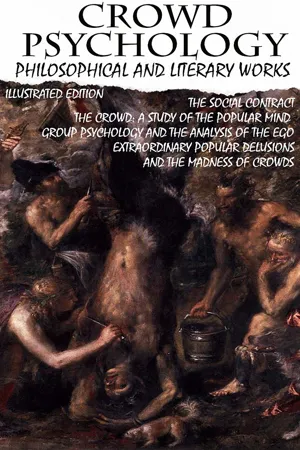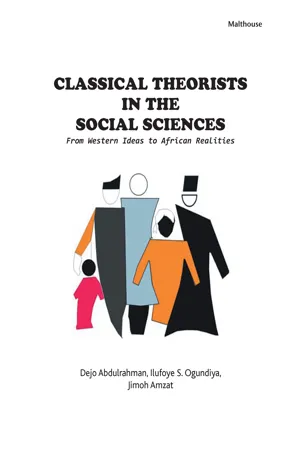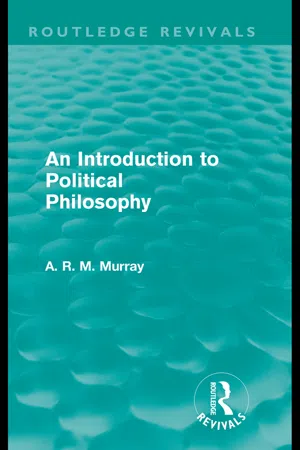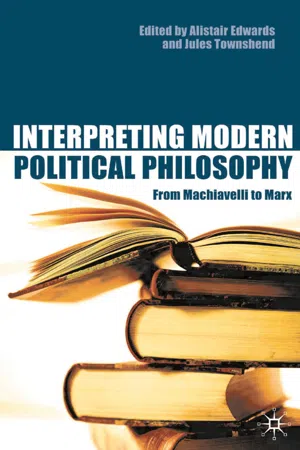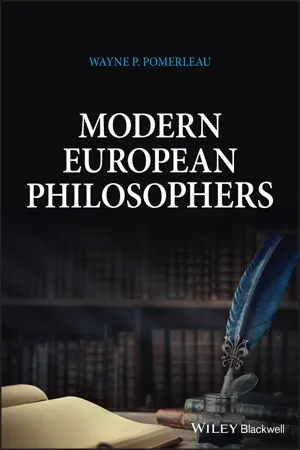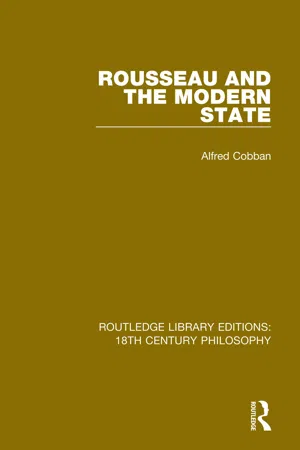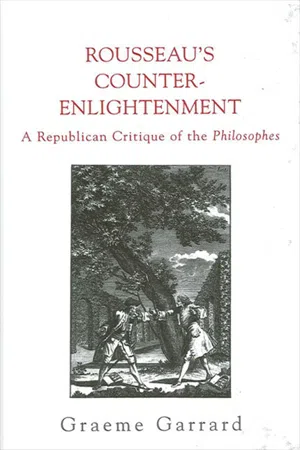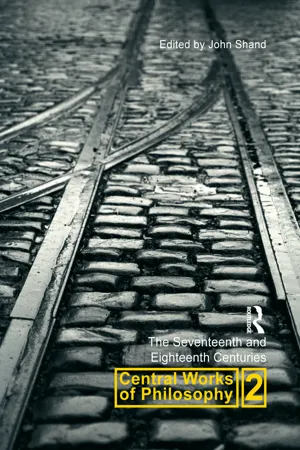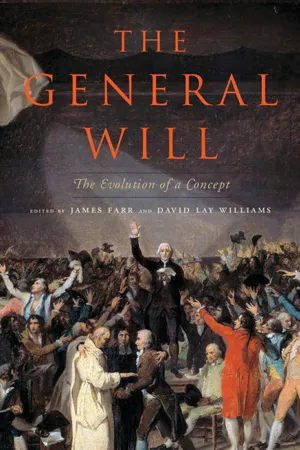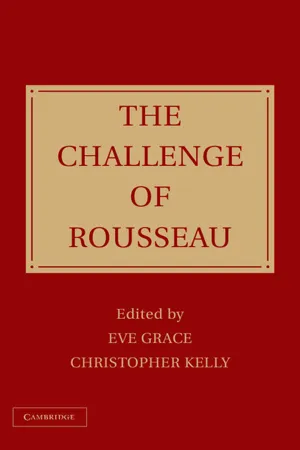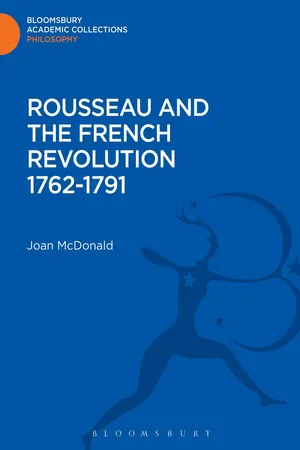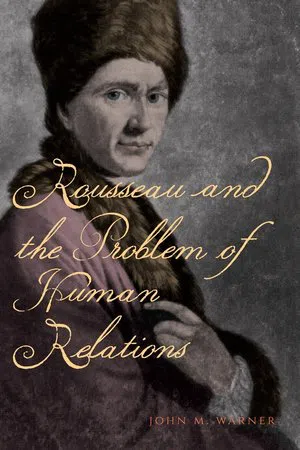History
Jean-Jacques Rousseau
Jean-Jacques Rousseau was an influential 18th-century philosopher whose ideas on social contract theory and the nature of man greatly impacted political thought. He argued for the inherent goodness of human nature and the importance of individual freedom. His works, including "The Social Contract" and "Emile," continue to be influential in the fields of political philosophy and education.
Written by Perlego with AI-assistance
Related key terms
1 of 5
12 Key excerpts on "Jean-Jacques Rousseau"
- eBook - ePub
Crowd psychology. Philosophical and Literary Works. Illustrated Edition
The Social Contract, The Crowd: A Study of the Popular Mind, Group Psychology and The Analysis of the Ego, Extraordinary Popular Delusions and the Madness of Crowds
- Jean-Jacques Rousseau, Gustave Le Bon, Sigmund Freud, Charles Mackay, Wilfred Trotter, Everett Dean Martin, G. D. H. Cole, James Strachey(Authors)
- 2023(Publication Date)
- Strelbytskyy Multimedia Publishing(Publisher)
Jean-Jacques Rousseau. The Social Contract Introduction For the study of the great writers and thinkers of the past, historical imagination is the first necessity. Without mentally referring to the environment in which they lived, we cannot hope to penetrate below the inessential and temporary to the absolute and permanent value of their thought. Theory, no less than action, is subject to these necessities; the form in which men cast their speculations, no less than the ways in which they behave, are the result of the habits of thought and action which they find around them. Great men make, indeed, individual contributions to the knowledge of their times; but they can never transcend the age in which they live. The questions they try to answer will always be those their contemporaries are asking; their statement of fundamental problems will always be relative to the traditional statements that have been handed down to them. When they are stating what is most startlingly new, they will be most likely to put it in an old-fashioned form, and to use the inadequate ideas and formulae of tradition to express the deeper truths towards which they are feeling their way. They will be most the children of their age, when they are rising most above it. Rousseau has suffered as much as any one from critics without a sense of history. He has been cried up and cried down by democrats and oppressors with an equal lack of understanding and imagination. His name, a hundred and fifty years after the publication of the Social Contract, is still a controversial watchword and a party cry. He is accepted as one of the greatest writers France has produced; but even now men are inclined, as political bias prompts them, to accept or reject his political doctrines as a whole, without sifting them or attempting to understand and discriminate - eBook - PDF
Classical Theorists in the Social Scienc
From Western Ideas to African Realities
- Dejo Abdulrahman(Author)
- 2023(Publication Date)
- Malthouse Press(Publisher)
He became a close friend of the French philosopher Denis Diderot, who commissioned him to write articles on music for the French encyclopaedia. Jean Jacques Rousseau attained fame with his prize- winning essay, “The Discourse on the Science and Arts” in which he rejected progress based on the arts and science; that they did not elevate the moral standards of human beings. Also, in the Discourse, Rousseau traced the rise of inequality and the consequent fall of the human individuals. He had many other write-ups in addition to the Discourse. Rousseau was persecuted for religious reasons where his social contract and other works were burnt both in Paris and Geneva. He died in1778 (Shaapera, 2015:37). John Locke, Jean Jacques Rousseau and Social Contract Theory 71 Unlike Hobbes, Rousseau did not paint a despondent picture of the state of nature. Jean Jacques Rousseau’s notion of the state of nature is not as gloomy as that of Hobbes, not as optimistic as that of Locke (Enemuo cited in Shaapera, 2015: 37).To Rousseau, men are not quarrelsome in the state of nature, nor have they the desire to dominate one another. Instead, they are solitary (like in Hobbes’), unreflecting, easily satisfied and without variety and opinion of selves. It was opined that after sometime men could no longer live isolated, so, initially, they came together occasionally to cooperate and unite their efforts to satisfy common wants. Later on, families are formed and subsequently several families congregate to form society. At the inception of this society, there is no inequality, but when the institution of private property evolves, a group of people resorts to plundering the properties of others. Violence and insecurity followed and hence a suggestion that power be established to govern men and protect them from each other and from common enemies. - Available until 19 May |Learn more
- A. R. M. Murray(Author)
- 2010(Publication Date)
- Routledge(Publisher)
CHAPTER IX Rousseau’s Theory of the General Will Jean Jacqes Rousseau was born in Geneva, the son of a mad watchmaker, in 1712, and died in 1778. Having left school at the age of twelve, and failed to settle in any of the trades to which he had been apprenticed, he fled from Geneva to Savoy four years later, and began a life of wandering and exile which, apart from twelve years spent in Paris (1744–1756), continued to his death. For part of these early years he was supported by women who befriended him; for part of them he lived the life of a vagabond and earned a livelihood as best he could. In 1743 he became secretary to the French Ambassador to Venice, and appears to have served him well, but quarrelled because he received no salary. In 1750 he achieved fame through winning a prize offered by the Academy of Dijon for the best essay on the question ‘Have the arts and sciences conferred benefits on mankind?’ Rousseau answered the question in the negative, contending that the arts and sciences create artificial wants and jeopardise the natural morality of unspoiled man. This theme was elaborated in his Discourse on Equality (1754), in which Rousseau argued that ‘man is naturally good, and only by institutions is he made bad’. It was in 1762 that Rousseau’s two most important works were published— Emile, his treatise on education, and the Social Contract or Principles of Political Right. The first offended both the Catholic and Protestant Churches by its support of natural religion., and the latter offended both the Council of Geneva and the French Government by its implied denial of the Divine Right of Kings. Rousseau left France and was befriended by Frederick the Great, who gave him asylum at Motiers. After spending three years there, however, he incurred local suspicion which placed his life in danger, and he fled to England in 1765. George III granted him a pension, and he formed friendships with both Burke and Hume - eBook - PDF
Interpreting Modern Political Philosophy
From Machiavelli to Marx
- Alistair Edwards, Jules Townshend, Alistair Edwards, Jules Townshend(Authors)
- 2017(Publication Date)
- Red Globe Press(Publisher)
5 Rousseau (1712–1778) A LAN A PPERLEY Introduction Rousseau’s political writings have earned him a reputation as one of the most important and influential of modern political theorists. Yet to describe Rousseau as a modern political theorist requires immediate qualification, for although Rousseau – in common with many other Enlightenment thinkers – rejected traditional forms of authority in favour of the individual capacity for self-determination and self-government, he nevertheless remained critical of much that is now associated with Enlightenment thought. For example, the Enlightenment is now usually associated with a belief in progress through the application of science and reason to social and political affairs. Rousseau, however, was sceptical of the idea that sci-ence and reason, if applied to social and political affairs, could deliver progress. Rousseau was often more interested in looking backwards to the ancient republics of Sparta and Rome than forwards, with many of his Enlightened contemporaries, to increasingly large-scale, industrialised societies underwritten by the principles of science and reason. Yet Rousseau’s writings were not mere nostalgia for a time long past. Rousseau spent much of his life living and working in monarchical France, and whilst it is true that he drew on ancient models in his critique of abso-lutist government, he also drew upon his knowledge and experience of an actually-existing republic, for he was, and proudly declared himself to be, a citizen of the republic of Geneva. Similarly, Rousseau’s critique of progress was not born out of a nostalgic desire to return to the past, but rather out of a sense that the dogmas and prejudices of pre-modern times were being replaced by new dogmas and prejudices: science and reason. Where many of his contemporaries saw the development of large-scale 99 - eBook - PDF
- Wayne P. Pomerleau(Author)
- 2022(Publication Date)
- Wiley-Blackwell(Publisher)
179 Modern European Philosophers, First Edition. Wayne P. Pomerleau. © 2023 John Wiley & Sons, Inc. Published 2023 by John Wiley & Sons, Inc. 12 12.1 Overview Rousseau was, arguably, the most complex (and least emotionally balanced) personality we have studied thus far. His life was fascinating, in part because he refused to accommodate it to others’ expectations. His thought was provocative, in part because it was riddled with internal tensions while defying conventional points of view. He was remarkably lacking in formal education, such as might render him a follower of any other thinker; yet he was so successfully self-educated as to enable himself to exploit his genius to rival others’ perspectives. He was neither an orthodox rationalist, following Descartes and others, nor an orthodox empiricist, following Hobbes and oth- ers. Indeed, he can hardly be said to have been an orthodox anything. Of all the modern thinkers we have studied thus far, he may have agreed most with Pascal, though this is ironic, given that that Jean-Jacques Rousseau Source: Georgios Kollidas/Adobe Stock 12 Jean-Jacques Rousseau 180 earlier thinker was an orthodox Christian to the marrow of his intellectual bones, while this later one was a freethinker/deist. Neither of them was a distinguished epistemologist or metaphysician; yet both developed insightful theories of human nature, as well as views in other areas (Pascal in the philosophy of religion, Rousseau in sociopolitical philosophy). Both were reacting against the mainstream approaches to philosophy in their times, thinking them ineffectual, and each one blazed his own distinctive path. We have already analyzed the earlier one; now let us consider the other. 12.2 Biography Jean-Jacques Rousseau was born on June 28, 1712, in the independent city-state of Geneva, which was committed to republican government and Calvinist virtue (it would not join the Swiss Confederacy until the nineteenth century). - eBook - ePub
- Alfred Cobban(Author)
- 2019(Publication Date)
- Routledge(Publisher)
CHAPTER VIJean-Jacques Rousseau AND THE MODERN POLITICAL MIND
1. BACK TO NATURE
Rousseau, I have said, was not a maker of systems: the incompleteness of his political thought is patent. For this reason it is somewhat apt to give an impression of patchwork, of patterns unfinished and threads left loose. I have tried to show that, despite this defect, a fairly consistent scheme of political ideas emerges from his works. There is a kind of unity which results from the activity of a powerful and original mind, dominated by well-defined intellectual preoccupations. That Rousseau’s thought possesses such unity becomes manifest above all if we consider his ideas in relation to their basic impulse, the partly intellectual, partly emotional motive force inspiring his political enquiry.If ever a writer had a single inspiring idea it was Rousseau. His primary interest was ethical. As has often been observed, he was brought by ethics to politics. The apparent impossibility of achieving his ideal for human life and conduct in the existing condition of society convinced him of the necessity for thinking out afresh their political foundations. In order therefore to appreciate the inspiration of his political writings and understand their underlying unity, we must discover what more general principle is hidden behind his political thought. One might suggest that his ideal is freedom. Yet in the Contrat social we find the primitive idea of freedom greatly restricted, and in fact natural liberty, as he recognizes, cannot exist once men have agreed to live together in a state. If we reflect on the careful moral training of Emile, the patriarchal regime of the Nouvelle Héloïse , the civic discipline of the Contrat social , the patriotic sacrifices demanded in the Corsica and the Poland - eBook - PDF
Rousseau's Counter-Enlightenment
A Republican Critique of the Philosophes
- Graeme Garrard(Author)
- 2012(Publication Date)
- SUNY Press(Publisher)
36 During these years he was the object of a popular adula- tion that, “in its breadth, intensity, and religious fervor, far outstripped Philosophe, Madman, Revolutionary, God 35 anything associated with any other eighteenth century writer.” 37 Before the Revolution this cult had been largely, although not exclusively, literary and biographical. Between 1761 and 1789, seventy editions of Rousseau’s novel were published in France alone, 38 as well as twenty-six editions of Emile, 39 while his principal political work, The Social Contract, was not reprinted at all in the decade before the Revolution, although many illicit copies were available in a variety of forms. Daniel Mornet’s study of pri- vate French libraries during the period 1750 to 1780 found almost two hundred copies of Julie, but only a single copy of Rousseau’s political trea- tise. 40 However, the latter appeared in four separate editions in 1790, three more the following year, and no fewer than thirty-two before the end of the century. 41 French Revolutionary soldiers at the front were even issued with a pocket-sized edition of The Social Contract in 1794. 42 During the 1790s Rousseau’s name became a virtual byword for the Revolutionary cause. The belief in a continuity between his thought and the French Revolution was cemented during the last decade of the eigh- teenth century and the first decade of the nineteenth, and has remained stubbornly entrenched ever since. 43 The protean character of his writings made it relatively easy for Revolutionary leaders to present him as the “father of the French Revolution,” despite his claim that he had “the greatest aversion to revolutions” (RJJ, 213 [OC I, 935]). 44 They sought to legitimate their cause by linking it directly to Rousseau’s name. - eBook - ePub
Central Works of Philosophy v2
Seventeenth and Eighteenth Centuries
- John Shand(Author)
- 2015(Publication Date)
- Routledge(Publisher)
The Social Contract Jonathan RileyDOI: 10.4324/9781315712253-8Introduction
Perhaps the most quoted line of Jean-Jacques Rousseau's The Social Contract begins its first chapter: "Man is born free, and everywhere he is in chains" (SC. i.l [1]; Rousseau 1997b : 41).1 Man is naturally free in the sense that he is born without any genuine obligations to others to refrain from doing whatever he judges is necessary for his self-preservation, once he acquires the capacities for judgement. Yet everywhere he is subjected to positive laws administered by some government whose leaders claim to be his rightful masters.The author of that provocative line, which echoes similar statements by the great seventeenth-century English social contract theorists Hobbes and Locke, was born in Geneva in 1712 to parents who were native citizens of the small republic. His mother died within days of his birth, and his watchmaker father left Geneva in 1722, forcing Jean-Jacques to find work as an apprentice to a notary and then an engraver. He wandered away in 1728 and found shelter with Mme de Warens at Annecy in Savoy Aside from a brief stint in Turin, where he converted from Calvinism to Roman Catholicism (although he reconverted to Calvinism in 1754), he spent the next dozen years living with her, educating himself at her salon and becoming her lover as of 1733. In 1740, he moved to Lyon to tutor the children of M. de Mably and became acquainted with Mably's elder brother, Etienne Bonnot (later the Abbe de Condillac), whom Patrick Riley calls "with Voltaire the greatest 'Lockean' in post-Regency France" (2001: 3). In 1742, Rousseau moved to Paris. There, after a few years, he began his lasting partnership with Therese Lavasseur, whom he eventually married in 1768, after she had apparently borne him five children, all said by him to have been abandoned at a home for foundlings (rather as he had been left to the care of others by his parents). He also met Denis Diderot and Jean d'Alembert and became a contributor to their famous Encyclopedia. Its fifth volume, for instance, published in 1755, included his Discourse on Political Economy. But his distinctive moral and political ideas led to tensions with them and other French Enlightenment philosophers, notably Voltaire, culminating in a decisive break in 1758, when he published his Letter to M. d'Alembert. In that work, he rejected d'Alembert's suggestion, which at the urging of Voltaire had been inserted into an article on "Geneva" published in 1757 in the seventh volume of the Encyclopedia, - eBook - PDF
The General Will
The Evolution of a Concept
- James Farr, David Lay Williams(Authors)
- 2015(Publication Date)
- Cambridge University Press(Publisher)
17. Rousseau, The Social Contract and Other Later Political Writings, p. 307n. 18. Rousseau notes earlier that “[t]he entire occupation of Kings . . . relates to only two objects, extending their domination abroad and rendering it more abso- lute at home” (592). 19. On the importance of theorizations of standing armies in modern European political thought, see J. G. A. Pocock, The Machiavellian Moment (Princeton: Princeton University Press, 1975), ch. 12. 20. Cf. Kant, “Conjectural Beginning of Human History” (Kant 8:117–118). For Kant, with enough effort over millennia, something approximating “complete art” might become our (second) nature. In Kant’s view, this would require a process that would partly depend upon some historical ironies such that good results would at least occasionally follow from largely unjust practices and institutions. In Rousseau’s view, however, our only earthly hope is to foster truly “perfect art.” I return to these overlapping, though importantly contrast- ing, perspectives in the final section of this chapter. 21. For a incisive interpretation that focuses on the former aspect of Rousseau’s thinking – amour-propre – in order to make the case that Rousseau’s constructive social and political theory depends crucially upon cultivating amour-propre in the right way, see Frederick Neuhouser, On the General Will of Humanity 303 Rousseau’s Theodicy of Self-Love: Evil, Rationality, and the Drive for Recognition (Oxford: Oxford University Press, 2008), esp. chs. 5 and 7. For illuminating analyses of the modern intellectual history of pride, including Rousseau, see Christopher Brooke, Philosophic Pride: Stoicism and Political Thought from Lipsius to Rousseau (Princeton: Princeton University Press, 2012); and Julie Cooper, Secular Powers: Humility in Modern Political Thought (Chicago: The University of Chicago Press, 2013). - eBook - PDF
- Eve Grace, Christopher Kelly(Authors)
- 2012(Publication Date)
- Cambridge University Press(Publisher)
3 Rousseau’s own mod- els include imaginary republics, imaginary characters such as Julie or Emile, and even his very deliberately designed self-portraits. In On the Social Contract, Rousseau says that a legislator is needed for the purpose of “public enlightenment” (SC II.vi: 67). As he puts it: “By itself, the people always wants the good, but by itself it does not always see it. The gen- eral will is always right, but the judgment that guides it is not always enlight- ened . . . Private individuals see the good they reject; the public wants the good it does not see. All are equally in need of guides” (SC, II.vi: 67). Already in the First Discourse, Rousseau delineates the task of such guides. He makes a rather flamboyant appeal to “Kings” to renounce the old prejudice, “invented by the pride of the great,” that “the art of leading [conduire] people is more difficult than that of enlightening them”; he defines enlightenment as engaging men “to do good willingly rather than to constrain them to do it by force,” by inference defining royal leadership as well (FD: 63). 4 Rousseau’s own campaign of enlightenment aims to retrieve liberty by inspiring new mores, tastes, and opinions. Rousseau credits Montesquieu with showing the fundamental importance of the relation of mores to government or laws (E: 468; SC II.xi: 76; III.i: 80). Building on Montesquieu, Rousseau claims to know both how to maintain and how to reform mores by directing public opinion about what is beautiful. Although Rousseau varies his empha- sis, mores, tastes, and opinion are closely intertwined in his view and all are essentially linked to love of the beautiful. That is, Rousseau presents mores and tastes as derived, if not indistinguishable, from opinions about the beautiful. To delineate the contours of Rousseau’s revolution, in this essay I will explore Rousseau’s reflections on changing these opinions. - eBook - PDF
- Joan McDonald(Author)
- 2013(Publication Date)
- Bloomsbury Academic(Publisher)
Only one serious attack on Rousseau's political theory from an anti-revolutionary source has been discovered. This was the pamphlet by Isnard, to which reference has already been made. The detailed criticism of Rousseau came from those who, at any rate up to the time when they were writing, agreed with and supported the achievements of the Revolution, or who, if they were writing during 1788 or the early months of 1789, put forward views about representation and sovereignty which were later adopted by the National Assembly. Reference has already been made to the view of Professor Talmon that the chief exponent of Rousseauism in 1789 was the abbd Sieyes. 1 In fact, Sieyes differed from Rousseau in respect of the three principles which are crucial to the latter's political thought: law, the general will and representation. In Sieyes' view, law was simply what the nation willed; the general will was the sum of individual wills, and the ordinary citizen's share in the expression of the general will was limited to the exercise of the vote. Once the representative assembly had been elected, the citizen was obliged to accept the assembly's decisions as law. Sieyes admitted only one situation in which the will of the elected deputies of the people might be subject to modification. In July 1789, he put forward the view that the work of a constituent assembly ought to be subject to the scrutiny and 1 Talmon, Origins, etc., pp. 69-75. See Gh. II. 105 i io6 THE CRITICS OF THE SOCIAL CONTRACT sanction of a convention elected for that specific purpose, before it could be regarded as valid. Once the constitution was estab-lished, the representatives became the exclusive agents of sove-reignty, and until that time, no other assembly or corporation could question or set itself up against those who had been elected by the people for the purpose of drawing up a new constitution. 1 There is no reason to suppose that these views were based on a misinterpretation of the Social Contract. - eBook - PDF
- John M. Warner(Author)
- 2016(Publication Date)
- Penn State University Press(Publisher)
Without denying the usefulness of the Condorcetian interpretation of the Social Contract, then, we must remember both that there are many other determinants of civic competence beside the sheer number of voters and that Rousseau devoted far more time to discussing these other determinants than to formal probabilis- tic analysis. Indeed, when we read the passage concerning “partial associations” in light of others from the Social Contract it becomes clear that Rousseau dis- likes the mediation of private groups between individual and state not simply because it decreases the effective size of the assembly but also because it sub- stitutes a narrow and particularizing form of self-love—the moi particulière — for the appropriately generalized and expanded moi commun. We see this more traditional republican concern at work particularly in Book III’s treat- ment of political decline and regeneration, where Rousseau again discusses the obstacles impeding the effective expression of the general will. Here, however, his concern is not the sheer number of voters but rather that citizens give their personal interests priority over public affairs: when social conditions have reached a point when it is predictable “that the general will won’t pre- dominate,” the reason given for this decline is that “domestic concerns absorb Rousseau and the Problem of Human Relations 196 everything” rather than because the pool of voters has shrunk. Rousseau goes on to claim that good regimes depend decisively on citizens having politically centered self-conceptions, on their tendency to think of themselves first and foremost as citizens: “The better constituted the State, the more public affairs dominate the minds of citizens. There is even less private business because since the sum of common happiness furnishes a larger portion of each indi- vidual’s happiness, the individual has less to seek through private efforts. In a well-run City, everyone rushes to assemblies” ( SC III.15, 102).
Index pages curate the most relevant extracts from our library of academic textbooks. They’ve been created using an in-house natural language model (NLM), each adding context and meaning to key research topics.
